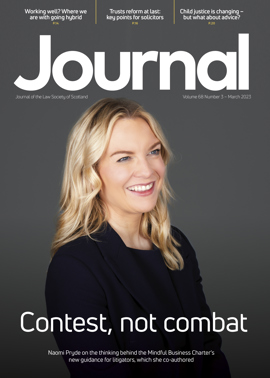Guardianship applications: optimising the process

Anyone practising in the field of adults with incapacity (“AWI”) law will be aware of the degree of patience and persistence that is needed to obtain guardianship and intervention orders for vulnerable people and their loved ones. The delays that are commonly experienced pose significant risks for such individuals, particularly where they result in them spending longer than appropriate in an acute hospital bed as their discharge cannot be legally authorised without a court order. Such delays can give rise to further medical complications, the development of comorbidities and even, in some cases, premature death.
Even if there are no direct health consequences, many individuals whose quality of life could be greatly enhanced by being moved into a specialist care facility (e.g. one offering specialist dementia care) are obliged to remain in a hospital setting which is not designed to and cannot offer the level and type of care and support they need. Not only is this detrimental to their wellbeing, it places unnecessary pressure on the NHS.
The root causes of these delays are systemic issues which have been identified and challenged by the Law Society of Scotland over a lengthy period of policy review and law reform, most recently through the consultations in the Scott Review of Mental Health. The review reported at the end of 2022 and recommended urgent legislation to cover deprivation of liberty safeguards rather than, as we are currently doing, using welfare guardianship as an unwieldy and resource-intensive workaround. The Society has pressed for investment in social work services so that more mental health officers (“MHOs”) can be deployed by local authorities to provide reports for AWI applications, and thus avoid or at least reduce the widespread breaches of the time limit in the 2000 Act to ensure human rights compliance. It has also called for more support and guidance for medical practitioners to enable them to provide the expert reports necessary in every application, a particularly important point in areas of Scotland where there are fewer psychiatrists available.
Smoothing the path
While these “big picture” issues are the subject of ongoing debate at the policy and resourcing level, and cannot be addressed without systematic and urgent reform to ensure compliance with international human rights obligations, can individual practitioners do anything to speed up AWI applications and get them to the door of the court? The following points, on which the writer has drawn on the experience of expert colleagues, may provide useful guidance for practitioners who perhaps take on this type of work less often. While no article can substitute for the accumulation of practical and technical experience, it is hoped this will assist colleagues open to developing their practice in this area.
Optimise information gathering. It can be time consuming to go back and fill in details that were missed in the original instruction. Consider creating a template which covers the information you need to prepare the application – this may even be sent to the client before the first meeting. If you are offering a private fee for the initial consultation and legal aid application (in the absence of non-means-tested advice and assistance), there may be a tension between covering everything you need to cover and being able to offer an affordable fixed fee. The use of checklists and templates, especially if the applicant can complete most of it themselves, can help resolve that.
Minimise funding delays. Delays in the guardianship application process are often blamed on legal aid. In the writer’s experience, however, SLAB will turn around applications for welfare guardianship funding quickly. It can sometimes be quicker to ask the adult’s social worker/GP for a supporting statement, rather than a friend/relative of your client. Bear in mind also that while guardianships with a welfare element receive non-means-tested legal aid, the same is not the case for advice and assistance, which is means tested on the incapable adult’s means. Not only does this create a potential barrier to accessing legal services, your client may not know much about the adult’s finances, and older adults may not receive passport benefits.
Be alert to conflicts. From the outset, it’s wise to have an eye for potential complexities such as another family member opposing your application. Such situations may require you to address suitability in more detail than for an unopposed application, or to consider other options such as the appointment of a professional guardian. Any reference to conflict around the adult should be addressed from the earliest stage to avoid or mitigate delays resulting from opposition and to enable longer-term solutions, such as mediation, to be considered.
Manage your experts. No guardianship or intervention order, even interim, can be obtained without three statutory reports – two medical reports (one from a consultant psychiatrist) and one MHO report. As practitioners know, the latter is what takes the time. The application must be submitted to court within 30 days of the first reporter visiting the adult, so the best plan is usually to line up the doctors but not formally instruct them until it is confirmed that an MHO has been allocated. This also allows time to identify a psychiatrist if the adult does not already have one overseeing their care – this is where having local knowledge and connections can help, enabling agents to build relationships with professionals who can provide good quality and timely reports.
Consider further reports. If your client seeks financial powers, the MHO may not comment on these and the OPG may make observations about this. In such circumstances it can be advisable to obtain other evidence which confirms the applicant’s suitability as a financial guardian, to avoid the case being continued to address this. This may include instructing additional expert reports, subject to availability of funding.
Time is of the essence. While the Act allows for submission of an application after 30 days if the medical reports are out of time (provided there has been no significant change in circumstances), note that the same is not true if the MHO report is out of time (something the writer learned the hard way). An application will be returned and the MHO must be asked to re-examine the adult, which has obvious disadvantages.
Ensure your application meets requirements. While the basics are set out in s 57 of the Adults with Incapacity (Scotland) Act 2000 and the Summary Application Rules, most sheriffdoms have practice notes which stipulate additional information which must be enclosed with or included in the application. These can be found on the SCTS website (scotcourts.gov.uk). In Lothian & Borders, for example, your client will need to sign a letter affirming they have no convictions and are not prevented from working with vulnerable adults (although a PVG certificate is not necessary). If your client does have convictions this is not necessarily a barrier, but the issue needs to be addressed, so the earlier it comes to light, the better. Post-Covid and with the advent of WebEx, many of us are raising actions in courts across Scotland, so it is important to check the local requirements. If you do not comply with the practice note, even if the oversight is relatively minor, your application is likely to be returned to you for amendment before warranting, a delay which can be avoided by checking against the note.
Attend to the OPG paperwork. When applying for financial powers, please ensure your client completes the OPG’s Guardian Declaration Form. The completed form should be sent to OPG alongside intimation of the application. Further information and a copy of the form can be found at publicguardian-scotland.gov.uk.
Be poised for intimation. There may be limited time to intimate before the first hearing. Many courts will now accept proof of emailed intimation, given the ongoing challenges of using recorded delivery. Depending on your funding you may also wish to proceed directly to instructing sheriff officers. If an interested party is intimated upon late, and they do not oppose the application, you may wish to ask them to confirm in writing they agree to a shortened period of notice, as many sheriffs will accept that and it avoids a continuation to re-intimate. Intimation on the adult is of course crucial, and sometimes staff in hospitals and other care settings do not understand the importance of doing so promptly (or at all!), so you may also consider writing to them separately with specific instructions on how to carry out this process and return the form 22 in time for the hearing.
Working in this area of practice can be challenging, particularly when operating within a legislative and resourcing framework which is overdue for reform and improvement. While AWI can sometimes feel like an undervalued area of legal services, for the individual practitioner it can be extremely rewarding and offers the chance to make a difference to the lives of our most vulnerable citizens. Although many of the factors causing delay are beyond the power of individual practitioners to influence directly, sharing good practice and not being afraid to go back to basics to learn from each other can help us to do all that we can to ensure that applications are dealt with as promptly as possible within the current resourcing arrangements.
Perspectives
Features
Briefings
- Civil court: No rule against redaction
- Corporate: Privileged or confidential – who can access
- Intellectual property: Big tech, AI and enforcement
- Succession: Non face-to-face will instructions; form C1
- Agriculture: “Route map” for agricultural reform
- Parking: About this ticket…
- In-house: Caring for the carers







